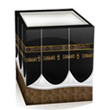A People Will Enter Paradise Without Making A Single Sajdah To Allaah?!
- Details
- Category: Sheikh Otheimin
- Published on Tuesday, 12 November 2013 11:48
- Hits: 1489
A People Will Enter Paradise Without Making A Single Sajdah To Allaah?!
Question:
O Noble Shaykh - may Allaah reward you - how do we reconcile between the statement of the Messenger, sallallaahu 'alaihi wassallaam: "There are a people who will enter Paradise and they did not make a single sajdah to Allaah", and between all of those hadeeth that mention "The disbelief of those who abandon the prayer"?
Answer:
The statement of the Messenger, sallallaahu 'alaihi wassallaam:
"Indeed they will enter the Paradise and they did not make to Allaah a single prostration." refers to the people who are ignorant of the obligation of the prayer, as is found in lands far from the (lands of) Islaam or in outlying desert areas, not hearing anything about the prayer. This also refers to those who die immediately after (entering) Islaam without making a single prostration for Allaah. Indeed we also say that this hadeeth which you have mentioned is from the unclear/ambiguous narrations - whereas the narrations concerning "the disbelief of the one who abandons the prayer" are from the unambiguous and clear narrations.
It is obligatory upon the believer in his utilising the Qur'aan and the Sunnah as a proof that he refers the unclear/ambiguous narrations to the unambiguous and clear narrations. The following of the unambiguous (mutashaabih) and to cast away the unambiguous/clear narrations is the path of those who have deviation in their hearts, and Allaah's refuge is sought.
Just as Allaah, the Most High, stated:
"He is the one who revealed to you the Book. From it are ayaat (verses) that are entirely clear (unambiguous), they are the foundations of the Book. And others not entirely clear (ambiguous). As for those who have deviation in their hearts, then they follow that which is not clear (ambiguous) thereof, seeking fitnah (tribulation), and seeking for its hidden meanings." (Aal 'Imraan:7)
And maybe the story of Usayrim bani 'Abdil-Ashhal, who left for Uhud and was killed. His people found him whilst he was taking his last breaths. They said: "O so-and-so, what is it that caused you to come out? Was it sympathy for your people or the desire for Islaam?" He said: "Rather, it was the desire for Islaam. I believe in Allaah and His Messenger." So they informed the Prophet (sallallaahu 'alaihi wassallaam) and he said: "Indeed, he is from the people of Paradise." Even though he was a man who did not make a single sajdah to Allaah, however Allaah favoured him with a good ending. And we ask Allaah that He gives us and you all a good ending.
Shaykh Muhammad bin Saalih al-`Uthaymeen
"Liqaa al-Baab al-Maftooh", (51-60), page (78). Arranged by Abdullaah At-Tayyaar.
Translated by Abu Khadeejah





















